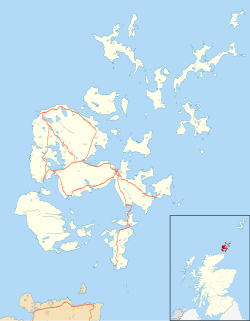| Tingwall | |
|---|---|
 Tingwall Harbour | |
Location within Orkney | |
| Civil parish | |
| Council area | |
| Country | Scotland |
| Sovereign state | United Kingdom |
| Police | Scotland |
| Fire | Scottish |
| Ambulance | Scottish |
Tingwall is a farm [1] and ferry terminal that lies on the north-east coast of Orkney's West Mainland on the Gairsay Sound in the parish of Evie and Rendall. There is a ferry connection to the islands of Wyre, Rousay and Egilsay. [2]

The harbour was built in the 1980s and is used by fishing vessels. [3] [4]
The name is derived from Old Norse. Recorded as Á Þingavoll in the Orkneyinga saga and as "Tyngwell" in 1492, [1] the first syllable þing indicates the site of a legislative or judicial assembly. [5] The second syllable, (at least in the case of similar examples such as Dingwall) may have been vollr meaning field. [1] [6] A ruined broch nearby may have been the place of assembly although there are no written records of meetings at Tingwall. [1] It may have fallen out of use and have been replaced by an assembly at Kirkwall. [7]
Tingwall is home to the Fernvalley Wildlife Centre. [8]
